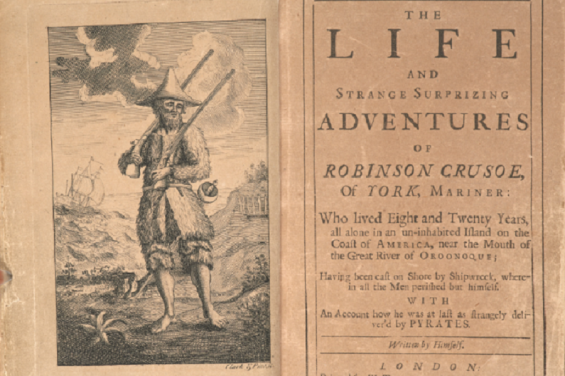When it was first published in April 1719, many readers naively believed it was the travelogue of unfortunate castaway Robinson Crusoe. But the book that bears the same name was just a fictitious account that was too real to be a tale.
Its author, an English journalist and trader by the name of Daniel Defoe, was very good at depicting the monstrous sufferings of Christian slaves abroad, especially the ones captured by Moroccan pirates from the Republic of Salé.
The writing abilities of Defoe were indeed new and unexpected. Readers saw Crusoe as a real man who was unfortunate enough to fall in the hands of corsairs and live as a castaway for years in an island inhabited by cannibals and prisoners.
Captured by Salé pirates
To put it in other words, the novel was a first : A realistic fiction written in the form of a diary and backed with documents and manuscripts. Nevertheless, it was very unique to European readers because it featured an adventure in Morocco, a country known for its piracy activities.

And that was carefully and thoroughly described by Defoe’s protagonist. The sailor left England in 1651 against the will of his parents who wanted him to have a law career and as unfortunate as he was, Robinson was captured off the Moroccan coast.
«Just as his (Robinson Crusoe) ship was approaching the Canary Islands, it was pounced on by a ‘Rover of Sallee’ and captured after a fierce fight», wrote W.R Bob Owens in an essay entitled «Defoe, Robinson Crusoe, and the Barbary Pirates» (2013).
In Morocco, the young man «together with the crew, was taken to Salé as a prisoner», the professor explains. Quoting Crusoe’s words about the Salé experience, Owens wrote that his treatment «was not as dreadful as at first [he] apprehended».
Indeed, as the «other members of the crew were taken ‘up to the country to the Emperor’s Court’», the protagonist was «kept by the captain of the pirate ship as a household slave in Salé».
And as the novel recounts, Robinson Crusoe spent two years in Salé, before being able to escape with the help of another slave. But his grand escape did not mark the end of his misfortune. While heading to South America, his ship wrecked and he found himself in an isolated island, where he spent 28 years of his life.
Salé rovers and Western literature
Regardless of the end of this novel that shaped the literary world, the story of this fictitious survivor bore too many events that resembled what some Christian slaves endured during the seventeenth and eighteenth centuries, especially in North Africa.

The book mimicked reality, which was not much different from what our friend «Robinson» went through. The same idea was manifested by Owens who wondered in his essay «what would [Defoe’s contemporary readers] have known about the ‘Sallee Rovers’, or about the conditions in which their captives were held in Morocco?»
«The short answer is that they would have known a great deal about this subject and would have had a keen and informed interest in it. The capture and enslavement of Christians by Muslim pirates operating out of ports on the coast of North Africa (…) had been going on since the latter part of the sixteenth century and was to continue right up to the beginning of the nineteenth century».
Moreover, Owens believes that when the novel was published «Defoe’s readers would have had access to many accounts describing how ‘Barbary pirates’ operated, and the conditions in which their captives were held». Here we can refer to several accounts, including the one of captain James Riley and Robert Adams.
Defoe’s novel was not only a way of referring to real accounts of Christian slaves in North Africa, but also a tool to voice his own opinions on slavery. According to the same essay, the English journalist «regarded the activities of the pirates as a serious threat to the development of international trade and commerce».

He had also, according to the same professor, «frequently called for the creation of a pan-European military force to suppress them». Although it is not known whether or not Defoe’s novel helped realize this wish, the account contributed to the emergence of a new literary genre. Robinson Crusoe is considered as the first realistic fiction novel and it is one of the most widely published books in history.




 chargement...
chargement...












